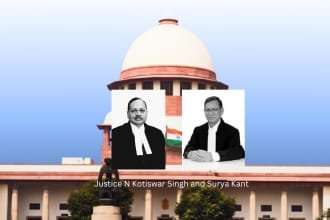In a landmark judgment reaffirming the principles of meritocracy and equality in public employment, the Supreme Court of India has held that seniority in direct recruitment through competitive examination must be based on marks obtained, and not on the basis of prior in-service experience. The decision came in the case of R. Ranjith Singh & Ors. v. The State of Tamil Nadu & Ors., reported as 2025 LiveLaw (SC) 528, which challenged the seniority policy favoring in-service Head Constables over more meritorious open-market candidates for recruitment to the post of Sub-Inspector of Police in Tamil Nadu.
Background of the Case
The matter revolved around a Tamil Nadu Government Order (G.O.) from 1995, which reserved 20% of direct recruitment vacancies for in-service Head Constables aspiring to become Sub-Inspectors. The said G.O. also provided that in-service candidates would be placed above open-market candidates in the seniority list, regardless of marks obtained in the selection exam.
This controversial policy was formally inserted into the Tamil Nadu Police Subordinate Service Rules, 1955 (1955 Rules) by way of an amendment in 2017 with retrospective effect from 1995. The result was that in-service candidates with lower marks leapfrogged higher-scoring direct recruits, gaining unfair seniority and resulting in accelerated promotions.
Petitioners’ Argument
The petitioners, who were direct recruits selected on merit, challenged the 2017 amendment on the grounds that it:
- Violated Article 14 (right to equality),
- Violated Article 16 (equality in matters of public employment),
- Violated Article 21 (protection of life and personal liberty due to arbitrary retrospective changes).
They argued that once a competitive exam is held for recruitment, seniority must be based on performance, not past service or arbitrary categorization.
Supreme Court’s Verdict
The Supreme Court bench, comprising Justices BV Nagarathna and SC Sharma, delivered a significant ruling invalidating the retrospective seniority policy. The Court made the following key observations:
“Once an appointment to service is made based upon a competitive examination, the seniority has to be maintained on the basis of performance in the examination and not by taking into account the past service alone.”
Key Highlights of the Judgment
- Invalidation of the 2017 Amendment:
The Court struck down the 2017 amendment to Rule 25(a) of the 1955 Rules, holding it violative of Articles 14, 16, and 21 of the Constitution. The Court was especially critical of granting retrospective effect to the amendment, calling it arbitrary and discriminatory. - Merit Trumps Experience in Direct Recruitment:
The bench clarified that in a direct recruitment process, in-service candidates who score lower cannot be granted seniority over better-performing open market recruits. - Recasting Seniority Lists Since 1995:
The Court ordered the recasting of all seniority lists since 1995, directing the Tamil Nadu Government to assign seniority solely based on marks obtained in the exam—irrespective of service background. - No Reversion for Already Promoted Officers:
To ensure minimal disruption, the Court directed that officers already promoted based on the flawed seniority lists will not be reverted, but no new promotions shall be made until the revised lists are issued. - Future Recruitment Must Be Uniform:
The Court directed the State to conduct one common competitive exam for 100% direct recruitment, including both open-market and in-service candidates. Seniority must be based purely on marks obtained in this unified selection process.
Constitutional and Judicial Precedents Cited
The Court referenced several precedents to bolster its reasoning:
- Dinesh Kumar Gupta v. High Court of Rajasthan, (2020) 19 SCC 604 – where the SC held that past service alone cannot determine seniority in direct recruitment.
- Prem Narayan Singh v. High Court of Madhya Pradesh, (2021) 7 SCC 649 – reaffirming that seniority in Limited Competitive Examinations must be based on merit, not service tenure.
Directions Issued by the Court
The Supreme Court gave the following time-bound directives:
a) Recast seniority lists since 1995 based on marks obtained in the selection exam.
b) Do not revert already-promoted officers, but pause further promotions until revised lists are ready.
c) Re-evaluate promotions post revised seniority within two months.
d) Eligible direct recruits shall be given notional promotions and benefits (excluding back wages).
e) Future recruitment exams must be unified, and seniority based only on marks.
Implications of the Judgment
This ruling is a resounding affirmation of the principle of meritocracy in public employment. By disallowing arbitrary seniority for in-service candidates with lower marks, the Court has:
- Upheld the constitutional mandate of equality in Articles 14 and 16.
- Discouraged retrospective amendments that adversely impact the rights of citizens.
- Reinforced that executive orders cannot override statutory rules unless constitutionally valid.
The judgment is especially relevant for state services, where internal lobbying or arbitrary government orders often dilute merit-based selection. It is expected to have a ripple effect across states and departments following similar policies.
Case Title & Citation
- Case Title: R. Ranjith Singh & Ors. v. The State of Tamil Nadu & Ors.
- Citation: 2025 LiveLaw (SC) 528
Conclusion
This judgment by the Supreme Court serves as a vital precedent in administrative and service law. It ensures that equal opportunity and meritocracy remain the cornerstones of direct recruitment, preventing state authorities from arbitrarily favoring in-service candidates over more deserving applicants. The decision is not only a win for the petitioners but also for the principles of fairness, transparency, and constitutional integrity in public service appointments.


